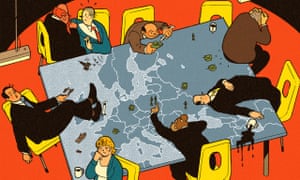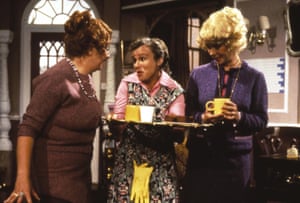The human factor gave us both Brexit and Trump
Human imperfection has shaped history and will determine the course of these frightening times
Lack of self-knowledge has recently done a lot of damage to the world. Not understanding the limitations of their gifts or public appeal, prominent politicians have wanted the wrong thing for themselves.
A good example is Gordon Brown. He believed he had what it took to be prime minister and spent more than a decade grieving bitterly that the job had gone instead to Tony Blair. But when he replaced Blair in an uncontested succession, he proved ponderous and inept, and went down to defeat in the ensuing election.
Of course the 2008 crash blighted the prospects of governments across the world; any incumbent Labour leader would have struggled. But there was never any sign that Brown would conquer his self-consciousness and relax into a role that needed quick thinking, an easy television manner and some rapport with the English middle class. For all his intelligence and ambition, these things were beyond him.
Just before he became prime minister, during an interview in his house in Fife, I noticed the change that came over him as soon as a photographer came into the room. Until then he had made a good show of informality, but when the camera appeared he stiffened like a Victorian patriarch wanting to look his best. It was painful to see, and no surprise that the pictures that caught him at his most sympathetic and “natural” were taken three years later, when his prime ministerial ordeal was over and he and his family were saying farewell to Downing Street.
He was wrong to want the job, just as Ed Miliband was wrong to displace his older brother, David; just as Hillary was wrong to imagine that she had some kind of right – the divine right of Clintons – to sit in the White House. Each of these failures had taken a struggle to achieve, but none was attractive to watch. Brown’s resentment of Blair was too obdurate, sullen and obvious; Ed Miliband’s decision to stand for election had a suggestion of fratricide; Hillary’s nomination looked like a victory for nepotism and a dynasty.
It didn’t end well for any of them. Unfortunately, it didn’t end well for millions of others either. Establishing a chain of cause and effect can amount to little more than wishful thinking, but it wouldn’t be unreasonable to imagine that a Labour party led by, say, Alan Johnson would have done better in 2010, while one led by David Miliband, despite his connections to the Iraq tragedy, could have won outright in 2015.
And if Hillary hadn’t chosen to run, perhaps Elizabeth Warren or Joe Biden might have done, and one of them, or Bernie Sanders, might now be the president-elect. Instead we live in a world of Brexit, Farage and Trump, and all its dark and more-than-usually unknowable future.
I wasn’t brought up to think in this way, to think that big historical changes owed their shape to the personality and behaviour of individual men and women. My parents had lived through the first world war as children – my father was 16 when it ended – and as a reaction to its propaganda later embraced a form of politics, or at least a way of thinking about the world, that insisted that the war had been fought for reasons that never appeared in the Daily Mail or the other big newspapers.
The idea that it was all the fault of Kaiser Bill had been replaced by a theory of competing empires and capitalism’s need for profits and markets. The arms dealer and “merchant of death” Basil Zaharoff sometimes featured in this theory, with his octopus-like reach into the treasuries of the warring nations.
Otherwise, names were few. Rather than the iniquitous Kaiser or the need to defend gallant little Belgium, what a later generation would know as the military-industrial complex was held largely to blame. War had been an inevitable outcome: an anonymous and ultimately callous economic system, decorated with flags and lies, had sent millions to their deaths.
To judge from parental conversations and the films and the books of the period (All Quiet on the Western Front, La Grande Illusion, Goodbye to All That), that view was held among more people, more fiercely, in the years between the world wars than it has been since, though as theory of causation it can still be heard whenever anyone says that the Iraq invasion was “all about the oil”. I don’t condescend to those who think so – no doubt oil played a part – or to my parents and the millions of others who had at least arrived at a more convincing explanation for the Somme than a conflict of Good v Evil. But the human factor is enormously understated.
As Christopher Clark shows in The Sleepwalkers, his magnificent account of the first world war’s proximate causes, ordinary human imperfection complicated everything to the point where the avoidable became the inevitable.
The notion that each European state knew what it was doing becomes laughable. In Britain, to take one of the simpler examples, Sir Edward Grey ruled the roost as the most powerful minister in Europe – though he showed very little interest in the place, rarely went there, spoke no foreign languages and felt ill at ease with foreigners. Although a Liberal, he adopted an anti-German position that upset most departments of the Liberal government apart from the foreign office. He was secretive. His commitment to France was neither widely shared nor widely known, so that while the French believed Britain would stand by them, the Germans, listening to other voices in Westminster and Whitehall, persisted in thinking that Britain would decline to involve itself in the Franco-Russian alliance.
Clark says that even if the foreign polices of the European powers had been “animated by a unified and coherent purpose”, the historian’s task would be hard enough. But the arguments and divisions inside every state added shifting layers of complexity.
Clark writes of “the chaotic intervention of monarchs, ambiguous relationships between civil and military, adversarial competition among key politicians in systems characterised by low levels of cabinet solidarity, compounded by the agitations of a critical mass press against a background of intermittent crisis and heightened tension over security issues”. The result was “policy oscillations and mixed signalling” that confused the statesmen of the day about the intentions of their friends as well as those of their enemies.
Remind you of anything? Apart from the “chaotic intervention of monarchs” – Kaiser Wilhelm, Tsar Nicholas and Emperor Franz Joseph (King George was an obedient soul) – every element of our present difficulty seems to be there. There is the agitation of the popular press; there are the low levels of cabinet solidarity. Who across the Channel could guess what we want? Who would want the job of telling them?
Enter Theresa May in that characteristic lope that looks to be half borrowed from Mrs Overall in Acorn Antiques. Like Brown, Miliband and Clinton, she wanted the job very much, calculating that if she lay low (“Submarine May”) in the referendum she would emerge as the unity candidate to replace Cameron in the 50/50 chance that he lost.
There were worse contenders; others still wait in the wings. “The lamps are going out all over Europe, we shall not see them lit again in our lifetime,” is the most famous thing Sir Edward Grey ever said, omitting to mention his role in the darkening.



No comments:
Post a Comment